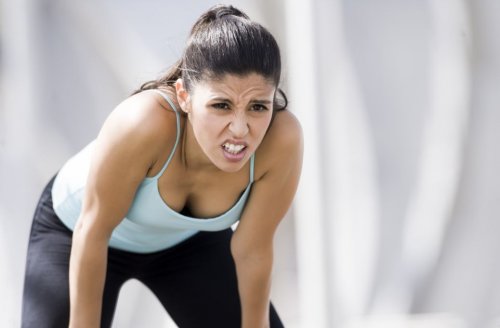Does Sexual Activity Affect Your Athletic Performance?

Some elite athletes are prohibited from having any sexual activity prior to competitions, as it’s commonly believed to ‘weaken’ the muscles. Others claim that it provides benefits related to endorphin and testosterone production. Do you want to know if your sexual activity affects your athletic performance? We will tell you in this article.
Sexual activity and athletic performance: are they compatible?
In the world of elite sports, there’s a saying that states that, you can’t have sex before a competition. While it may seem a modern trend, the truth is that they had the same theory in ancient Greece—Olympic athletes had to avoid sex before games. Apparently, maintaining abstinence allowed them to achieve better sporting results.

However, some centuries later, it was concluded that ‘making love can revitalize us’ if we’re lacking in energy. This isn’t only related to sports, but to any other activity.
Maybe you have heard of the phrase, in the famous film, used by Rocky’s coach: ‘women weaken the legs’ before a fight? It’s also a known fact that the famous boxer, Muhammed Ali, didn’t have sex for six weeks before getting into the ring.
This controversy is also instilled in other areas of expertise. A well-known Jamaican sprinter indicates that, sexual activity the night before a race can prevent him from winning a gold medal.
Of course, we can’t leave out the former coach of Argentina’s national soccer team, Salvador Bilardo. He allowed players to continue with sexual relations, as long as ‘the women made all of the effort!’ Thus, protecting his subordinate’s legs.
One of the most memorable statements regarding this issue was made by a former New York Yankee’s baseball player: “The problem isn’t having sex before a game, but spending all night looking for someone to go to bed with”. Clearly, he was alluding to the athletes’ nights out, and not to the intimate relationship itself.
Apparently, the effect of sexual activity is ‘contrary’ in women, and therefore positive. Since according to a boxer, it raises testosterone giving you more energy and aggressiveness in the ring.
What about amateur athletes?

Putting aside the previous examples, we should know what happens to regular people that play sports. Does sexual activity affect athletic performance at the gym or at an aerobics class?
When you have sex, the body releases several hormones ‘of happiness’, which can actually improve our performance when lifting weights, running on the treadmill, riding a bicycle, or doing sit-ups.
Everything depends on the intensity of our sexual activity, and of course, with the type of training that we do. For some people, sex is revitalizing and gives them more energy to complete routines; for others, it takes away vitality and they can’t lift the same weight or run at equal speed.
In any case, the same thing happens with other events in everyday life. For example, if we had problems at work, we won’t be able to concentrate on training. On the other hand, if we get excellent news, it’s likely that we will have more energy to finish our workout.
Do sports affect your sexual activity?

The opposite situation must also be taken into account: does regular exercise reduce the frequency of sexual activity? If your gym routine was intense, you probably won’t have enough energy leftover for intimacy, or your performance will be lower than you would like.
We mustn’t ignore the fact that practicing sports allows us to be healthier, feel more comfortable with our bodies, and increases our confidence. If we look attractive, we will have more motivation generally. Of course, that’s without counting the many circulatory and respiratory benefits offered by regular exercise.
Therefore, it’s not about knowing if sexual activity affects athletic performance or vice versa. It’s about being able to balance both activities.
Some elite athletes are prohibited from having any sexual activity prior to competitions, as it’s commonly believed to ‘weaken’ the muscles. Others claim that it provides benefits related to endorphin and testosterone production. Do you want to know if your sexual activity affects your athletic performance? We will tell you in this article.
Sexual activity and athletic performance: are they compatible?
In the world of elite sports, there’s a saying that states that, you can’t have sex before a competition. While it may seem a modern trend, the truth is that they had the same theory in ancient Greece—Olympic athletes had to avoid sex before games. Apparently, maintaining abstinence allowed them to achieve better sporting results.

However, some centuries later, it was concluded that ‘making love can revitalize us’ if we’re lacking in energy. This isn’t only related to sports, but to any other activity.
Maybe you have heard of the phrase, in the famous film, used by Rocky’s coach: ‘women weaken the legs’ before a fight? It’s also a known fact that the famous boxer, Muhammed Ali, didn’t have sex for six weeks before getting into the ring.
This controversy is also instilled in other areas of expertise. A well-known Jamaican sprinter indicates that, sexual activity the night before a race can prevent him from winning a gold medal.
Of course, we can’t leave out the former coach of Argentina’s national soccer team, Salvador Bilardo. He allowed players to continue with sexual relations, as long as ‘the women made all of the effort!’ Thus, protecting his subordinate’s legs.
One of the most memorable statements regarding this issue was made by a former New York Yankee’s baseball player: “The problem isn’t having sex before a game, but spending all night looking for someone to go to bed with”. Clearly, he was alluding to the athletes’ nights out, and not to the intimate relationship itself.
Apparently, the effect of sexual activity is ‘contrary’ in women, and therefore positive. Since according to a boxer, it raises testosterone giving you more energy and aggressiveness in the ring.
What about amateur athletes?

Putting aside the previous examples, we should know what happens to regular people that play sports. Does sexual activity affect athletic performance at the gym or at an aerobics class?
When you have sex, the body releases several hormones ‘of happiness’, which can actually improve our performance when lifting weights, running on the treadmill, riding a bicycle, or doing sit-ups.
Everything depends on the intensity of our sexual activity, and of course, with the type of training that we do. For some people, sex is revitalizing and gives them more energy to complete routines; for others, it takes away vitality and they can’t lift the same weight or run at equal speed.
In any case, the same thing happens with other events in everyday life. For example, if we had problems at work, we won’t be able to concentrate on training. On the other hand, if we get excellent news, it’s likely that we will have more energy to finish our workout.
Do sports affect your sexual activity?

The opposite situation must also be taken into account: does regular exercise reduce the frequency of sexual activity? If your gym routine was intense, you probably won’t have enough energy leftover for intimacy, or your performance will be lower than you would like.
We mustn’t ignore the fact that practicing sports allows us to be healthier, feel more comfortable with our bodies, and increases our confidence. If we look attractive, we will have more motivation generally. Of course, that’s without counting the many circulatory and respiratory benefits offered by regular exercise.
Therefore, it’s not about knowing if sexual activity affects athletic performance or vice versa. It’s about being able to balance both activities.
All cited sources were thoroughly reviewed by our team to ensure their quality, reliability, currency, and validity. The bibliography of this article was considered reliable and of academic or scientific accuracy.
- Habel, M. A., Dittus, P. J., De Rosa, C. J., Chung, E. Q., & Kerndt, P. R. (2010). Daily Participation in Sports and Students’ Sexual Activity. Perspectives on Sexual and Reproductive Health. https://doi.org/10.1363/4224410
This text is provided for informational purposes only and does not replace consultation with a professional. If in doubt, consult your specialist.








